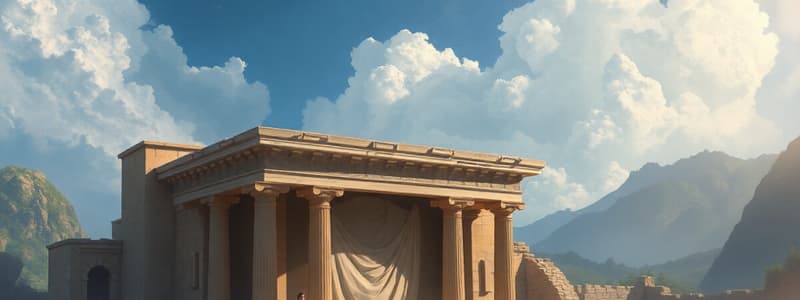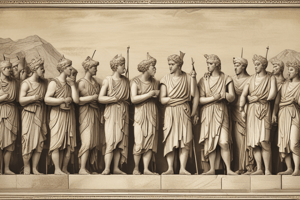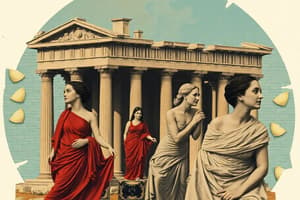Podcast
Questions and Answers
What is the function of the ekkyklema in ancient Athenian theater?
What is the function of the ekkyklema in ancient Athenian theater?
- To create musical elements for performances
- To project the voices of actors
- To represent a god with a crane
- To roll out and reveal scenes (correct)
Which character is described as a half-man, half-goat figure associated with satyr plays?
Which character is described as a half-man, half-goat figure associated with satyr plays?
- Jason
- Satyr (correct)
- Zeus
- Helios
What was the primary demographic of the audience in the ancient Athenian theater?
What was the primary demographic of the audience in the ancient Athenian theater?
- Adult men, some women, and enslaved people (correct)
- Exclusively professional actors
- Women and children
- Only wealthy citizens
What was the main theme of tragedy in ancient Athenian plays?
What was the main theme of tragedy in ancient Athenian plays?
What is the significance of philia in the context of Jason and Medea’s relationship?
What is the significance of philia in the context of Jason and Medea’s relationship?
What type of event did the City Dionysia primarily involve?
What type of event did the City Dionysia primarily involve?
What aspect of Athenian marriage is highlighted in the context of Jason and Medea's conflict?
What aspect of Athenian marriage is highlighted in the context of Jason and Medea's conflict?
What was a notable element of the costumes used in ancient tragedies?
What was a notable element of the costumes used in ancient tragedies?
What character trait does Medea struggle with throughout the myth?
What character trait does Medea struggle with throughout the myth?
What do the Furies represent in the context of the Medea myth?
What do the Furies represent in the context of the Medea myth?
In Ovid's retelling of the Medea myth, which action of Medea evokes fear from others?
In Ovid's retelling of the Medea myth, which action of Medea evokes fear from others?
What broader themes are highlighted through Medea's character in modern adaptations?
What broader themes are highlighted through Medea's character in modern adaptations?
How does the Chorus perceive Medea's actions?
How does the Chorus perceive Medea's actions?
What is significant about the representation of China in the context of Esch and Medea?
What is significant about the representation of China in the context of Esch and Medea?
What metaphor is used in the latter parts of 'Salvage the Bones' to describe Esch's experience?
What metaphor is used in the latter parts of 'Salvage the Bones' to describe Esch's experience?
How is the theme of motherhood debated in 'Salvage the Bones'?
How is the theme of motherhood debated in 'Salvage the Bones'?
What crime influenced the perception of the Medea myth in contemporary discussions?
What crime influenced the perception of the Medea myth in contemporary discussions?
What do the vases depicting Medea's actions signify in Greek culture?
What do the vases depicting Medea's actions signify in Greek culture?
What societal issue is highlighted through the character of Skeetah in 'Salvage the Bones'?
What societal issue is highlighted through the character of Skeetah in 'Salvage the Bones'?
What is a key difference in the presentation of Medea's actions in Greek versus Roman versions of the myth?
What is a key difference in the presentation of Medea's actions in Greek versus Roman versions of the myth?
What impact does the character of Manny have on Esch in 'Salvage the Bones'?
What impact does the character of Manny have on Esch in 'Salvage the Bones'?
Flashcards
The Theater of Dionysus
The Theater of Dionysus
An ancient Greek theater in Athens built for theatrical performances, capable of seating up to 15,000 people.
Ekkyklema
Ekkyklema
A wheeled platform used in ancient Greek theater to reveal scenes or characters inside a building, bringing them into the audience's view.
Mechane
Mechane
A crane or hoist used in ancient Greek theater to raise and lower actors, often representing gods or supernatural beings.
City Dionysia
City Dionysia
Signup and view all the flashcards
Choregoi
Choregoi
Signup and view all the flashcards
Tragedy
Tragedy
Signup and view all the flashcards
Satyr Play
Satyr Play
Signup and view all the flashcards
Philia
Philia
Signup and view all the flashcards
Study Notes
Ancient Athenian Theater
- Theater of Dionysus seated 15,000
- Staging elements: backdrops, scene painting, ekkyklema (rolled out thing), mechane (crane for gods)
- Masks: linen, cork, or wood; large mouths for projection
- Dionysus: god of wine, fruitfulness, theater, ecstasy; born from Zeus and Semele
- Considered a foreign "eastern" import, accompanied by satyrs
- City Dionysia: late March/early April, 9-month planning by eponymous archon
- Funding: city, mostly choregos (producer) as liturgy
- Actors: all male, amateur and professional
- Cost: 3000 day’s wages, 10% navy cost
- Schedule: previews, prep day/cult statue of Dionysus, procession, contest of boys/dithyrambs, poets, tragedies (3x3 tragedies + 1x3 satyrs)
- Audience: mostly men, some women and enslaved people; cost 1/3 drachma; interactive and enjoyable
Tragedy and Comedy
- Tragedy: mythological, heroic characters, gods; musical; elegant clothes, laced boots, masks
- Satyr play: raunchy palate cleanser; parody of myths and heroes; satyrs (half-man, half-goat, drunk)
- Comedy: set in present; ordinary people; appear as idiots; neighborhood families; limp leather phallus and body padding; 4 characters
Medea and Jason's Backstory
- Jason (Thessaly prince) journeys to Colchis for golden fleece
- Medea (Colchian princess) helps Jason; murders brother; murders Jason's uncle; settles in Corinth; has two sons
- Context of Athenian marriage: emphasis on dowry and ritualized relationships (philia)
Medea, First Half
- 5th-century BCE Athenian marriage customs: bride/groom relationships, dowry, divorce (easy for men, hard for women)
- Philia: Kinship/ritual friendship; reliable; Jason's arguments for marrying Corinthian princess: Medea helped him, she has been “repaid,” her love was merely lust; children will benefit, Jason's money and connections will help.
Medea, Second Half
- Different endings of the Medea myth: Corinthians killing the children (accidental vs. deliberate)
Vases Depicting Medea
- Medea killing her children
- Medea escaping in a chariot
Furies
- Underworld goddess of vengeance; punish unnatural orders (killing children)
Medea's Indecision and Heroic Honor
- Desire to allow enemies to laugh at her vs. winning a reputation for acting decisively
Chorus' Reaction
- Empathy for Medea's grief
- Reflection on parenthood
Roman Medeas
- Ovid's Metamorphoses: Medea's actions in Colchis and lolchus; falling in love with Jason, killing Pelias; Roman portrayal of Medea as a bad wife.
Medea and Limits of Reception
- Why "Black Medeas"? Connection to African spiritual tradition (exile, loss, longing for home); challenges of power; social constraints harming children
- Margaret Garner: Modern Medea; killed children, "black arts" view, racially based accusations
- Medea Project: Theater for incarcerated women, highlights themes of imprisonment
Salvage the Bones, First Third
- Esch, family, and community: loss, hunger, pregnancy, love for Manny, Randall's potential scholarship, Skeetah's love for China and puppies, Junior's desire to be included, daddy's anxiety about the storm
- Hurricane Katrina: 2005; 1492 deaths; losses exacerbated by racism/classism
- Esch as Medea, Manny as Jason; Esch’s understanding of mythic women: powerful, beloved, vengeful; China as Medea (fight puppies, wants to avoid childbirth), initially a good mother; Skeetah as Medea’s brother
- Esch, Skeetah, and China as Medea figures reacting to violent situations
Salvage the Bones, Second and Third Thirds
- Debates over motherhood: strength or weakness; use of resources vs having something to protect
- Pitbulls and fighting: working class dog fighting, connection to race; Michael Vick case
- Significance of China’s whiteness; significance of China’s victory (animality, barbarity)
- Skeetah's choice; Esch’s choices regarding Manny and motherhood; “Salvage” as a metaphor for reception: using Greek myths to understand American experience (losses from slavery, diaspora)
Studying That Suits You
Use AI to generate personalized quizzes and flashcards to suit your learning preferences.




